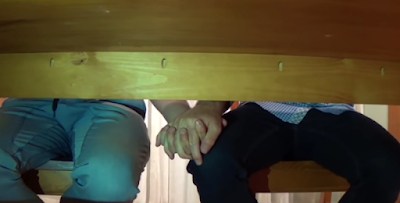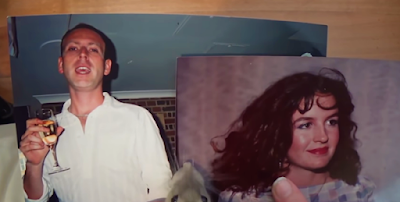forget what
you’ve heard
by Douglas Messerli
Dan Fry (screenwriter and director) Dancing
Around / 2017 [15 minutes]
In Australian filmmaker Dan Fry’s
2017 short film, Dancing Around, he explores a family breakup due to a
mid-life gay relationship through the daughter, Maddy’s (Taylor Morgan) eyes.
Maddy’s mother Ned (Nereda Taylor) is a lawyer who daily drives to work
from the family’s Queensland country home with her co-worker Johan (Johan
Venter), while her husband, Dan (played by the director) appears to be a
stay-at-home father. Certainly, it appears that he has the closest relationship
to Maddy, encouraging her dancing, insisting she help out with kitchen duties,
and indicating other attentions that evidences the fact that it has become
mostly his responsibility to raise Maddy.
But there are subtle signs, early on in this film, that things are not
as perfect in this family as they first may seem. Maddy seems to be spending in
an inordinate amount of time dancing; indeed Ned and Dan have even built her a
small separate studio for her to get away from all other human contact, which
she apparently takes every opportunity to do. Later, we learn that there have
been regular arguments between the two adults, several of which she has overheard.
Although she seems to like Ned’s law
partner Johan, a visit from him on this particular occasion does not elicit
joy. Maddy complains that all her mother and he talk about is law. But we
suspect there are also other reasons. And when he arrives, we soon begin to
wonder—when after dinner, Dan excuses himself from his wife’s company in order
to take a walk, inquiring beforehand whether or not Maddy is in her room, and
we observe Johan soon after exiting from what appears to be his room during his
stay—what else is behind Maddy’s displeasure in Johan’s evidently commonplace
visit.
Fortunately, Fry postpones the scene, narratively returning to a scene
somewhat earlier, evidently after dinner with the adult trio, when Maddy is
asked to dance. But even before she is requested to perform by her father, we
see a slight argument erupt as Ned seems to wonder whether her performance is
worth watching, while Dan appears to scold her for not ever being there to see
her work. Johan quickly resolves the devolving argument by asking to see her
dance, her father reminding Maddy to “Forget what you might have heard, this is
your time to shine.” The child dances a free-form series of movements that is
quite remarkable.
The director narratively moves the film yet a little further back,
during a scene while they are all at dinner, Maddy stabbing at her fruit which
she clearly is not interested in eating. She drops a piece of fruit on the
floor and bends down to pick up, observing under the table that her father and
Johan are holding hands. We see her break down in tears soon after.
We now return to the scene that was interrupted earlier, where the two
men meet and kiss a ways off from the house, but alas not far enough away from
Maddy’s young eyes, as she stands on the balcony of the home, we later
discover, photographing them. Clearly, Maddy is a kind of later version of
Henry James' Maisie, of that novelist's What Maisie Knew.
By the time the men return from their tryst, Maddy has shown the
pictures to her mother. And when they return it is with the intention of
finally revealing the truth to Ned about their relationship. She, however,
bluntly faces off with her recent discovery, which obviously doesn’t end well.
Dan is seen packing up, the two males obviously heading off, but Dan
trying to make certain that Ned will remind Maddy, who apparently now refuses
to talk with him, that he will be back with her in a couple of days. The
bitter Ned reports that Maddy was not truly is daughter, a statement overheard
evidently by Maddy. Johan insists that Dan go up to talk to Maddy as the film
comes to a close; Maddy in her room alone, two pet hamsters upon her shoulders,
takes down the photos of her father and mother to study them carefully as if
she seeking in them some forgotten reality. The work ends with clips of film
taken from when Maddy was a baby being carried, hugged, and kissed by her
father, no mother in sight.
The tragedy in this painful tale of late
coming out—a common occurrence alas in societies, such as Fry argues Queensland
is, where men and women are still encouraged to hide their sexual identities—is
the pain it brings to Maddy who has already pulled apart from the human world
as she puts all of her confused feelings into dance. Maddy may lose her
greatest source of love, it appears, if her father is refused visiting
privileges or if he is refused his parental care for her. The mother clearly
has been far too busy to properly demonstrate her love for her daughter. And
yet through her final statement we realize she is making a case for Dan to have
no rights concerning his beloved daughter.
In this sense the film represents a
brutal reality that occurs in homophobic worlds in which individuals are forced
to escape, like Maddy has into dance, into cocoons spun with lies and
dishonesty.
Los Angeles, April 6, 2022
Reprinted from World Cinema
Review (April 2022).






No comments:
Post a Comment